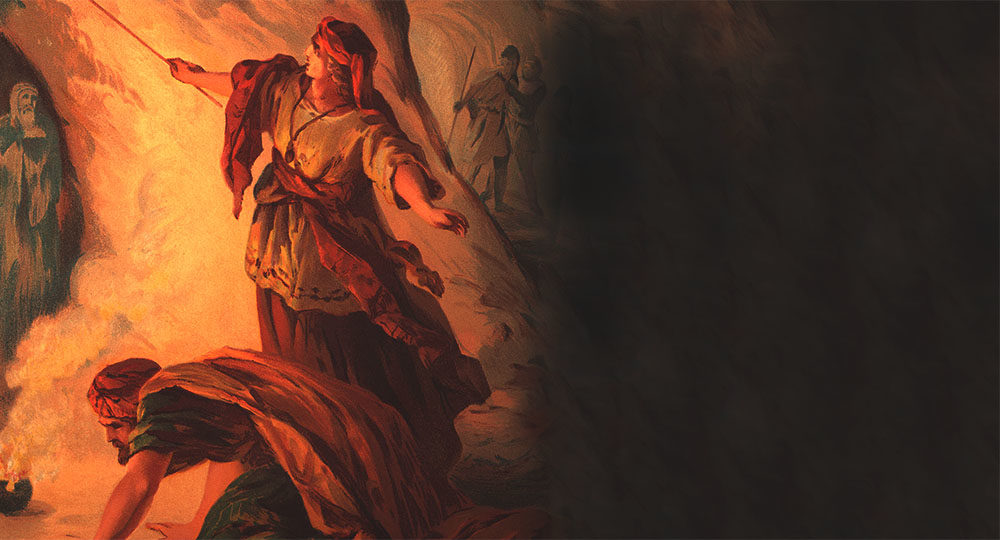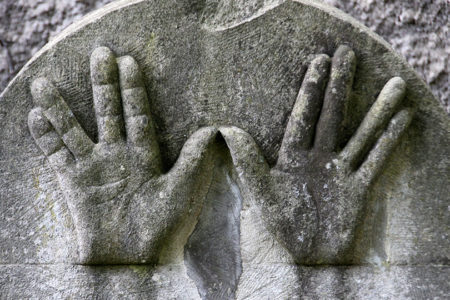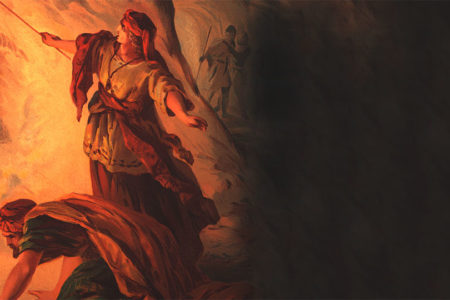‘Bring Up Samuel for Me’
Here is a look at how fear drove a desperate king to do the unthinkable.
Disobedience to God can drastically change a person’s life. King Saul’s disobedience dramatically altered both his life and his kingship.
As a consequence for transgressing into the priestly office and then failing to carry out God’s judgment on the Amalekites, the prophet Samuel pronounced that Saul would be dethroned and his dynasty given to a man after God’s own heart (1 Sam. 13:13–14).
CHARTING THE BIBLE CHRONOLOGICALLY
See where the story of Samuel and Saul fits in the biblical narrative in Charting the Bible Chronologically by Ed Hinson and Thomas Ice.
God instructed Samuel to anoint David as king of Israel. Upon David’s anointing, the Spirit of God left Saul and fell on David from that day forward, making Saul so angry he became obsessed with destroying David, chasing him throughout the Judean hills.
While Saul pursued David, the kings of Philistia were amassing a huge army on Israel’s borders, threatening the tribes of Issachar, Zebulun, and Asher. Saul saw the Philistines setting up camp at Shunem near the Sea of Galilee, so he gathered his soldiers at Mount Gilboa, terrified by the Philistines’ immense army (28:4–5).
The Desperation of the King
Saul needed spiritual guidance. In the past, Samuel guided Saul, but he had died (v. 3). Saul’s plea to God for counsel went unanswered (v. 6), and he could not seek help from the priests because he had ordered 85 priests to be killed (22:9–23). Alone and scared, Saul was left to his own devices.
Desperate for direction, the king did the unthinkable: He turned to a medium (28:7). Such counsel was an abomination God strongly condemned (Dt. 18:10–14; Isa. 8:19–20). God forbade and banned occult practices, and Saul knew this fact well. In fact, earlier in his reign, Saul had banished all mediums and spiritists from Israel.
Filled with despair and hopelessness, the king commanded his servants, “‘Find me a woman who is a medium, that I may go to her and inquire of her.’ And his servants said to him, ‘In fact there is a woman who is a medium at En Dor’” (1 Sam. 28:7). En Dor was merely six or seven miles from Gilboa.
Disguising himself, Saul took two men and traveled at night to see the medium. He asked the woman to perform a séance for him and bring someone up from the dead. She reminded him of the ban that had been imposed upon such practices and told Saul it could mean her death. Saul assured her she would not be punished (vv. 8–10).
Given assurance, the woman asked, “‘Whom shall I bring up for you?’ And he said, ‘Bring up Samuel for me’” (v. 11). Scripture does not reveal what the woman actually did; but being a medium, she would have used the forbidden practices of necromancy. Upon seeing the apparition of Samuel, the shocked medium let out a loud scream, evidently not expecting to see anything but an illusion. Instantly the medium declared, “Why have you deceived me? For you are Saul!” (v. 12). Again, Saul assured her no evil would befall her (v. 13).
Saul asked her, “What did you see?” (v. 13). Then he asked, “What is his form?” (v. 14). The woman replied, “An old man is coming up, and he is covered with a mantle” (v. 14).
Perceiving the form was Samuel, Saul humbled himself and “stooped with his face to the ground and bowed down” (v. 14) out of respect for Samuel.
The Dialogue
Samuel asked, “Why have you disturbed me by bringing me up?” (v. 15).
Saul answered, “I am deeply distressed; for the Philistines make war against me, and God has departed from me and does not answer me anymore, neither by prophets nor by dreams. Therefore I have called you, that you may reveal to me what I should do” (v. 15).
Samuel responded by asking Saul a rhetorical question: “So why do you ask me, seeing the LORD has departed from you and has become your enemy?” (v. 16).
Before Saul could answer, Samuel supplied the answer:
For the LORD has torn the kingdom out of your hand and given it to your neighbor, David. Because you did not obey the voice of the LORD nor execute His fierce wrath upon Amalek, therefore the LORD has done this thing to you this day. Moreover the LORD will also deliver Israel with you into the hand of the Philistines. And tomorrow you and your sons will be with me. The LORD will also deliver the army of Israel into the hand of the Philistines (vv. 17–19).
In other words, Saul and his sons would be killed, and Israel would be defeated and occupied by the Philistines.
Saul went into shock: “Immediately Saul fell full length on the ground, and was dreadfully afraid because of the words of Samuel” (v. 20). Lack of food all day and night also left him extremely weak. Ironically, the woman had compassion on Saul and tried to get him to eat. She had risked her life by agreeing to call up Samuel, and now Saul’s life was in jeopardy.
She sympathetically tried to comfort him, putting aside her own welfare and security. She had good reason to do so. She heard Samuel predict that Saul would die the next day; and should Saul have been found dead in her house, she would have been held accountable and put to death (vv. 21–22).
The woman tried to convince Saul to eat to renew his strength, but he adamantly refused. It wasn’t until his two companions persuaded him that he agreed. The medium quickly killed her fatted calf and baked unleavened bread for Saul and his servants. Ironically, Saul’s last supper was a meal fit for a king, but any hope of retaining his kingship was lost because he would die at the hands of his enemies (vv. 24–25).
The Scholarly Debate Over Samuel
Bible scholars have thoroughly discussed Samuel’s appearance with differing conclusions. Some believe it was a psychological experience in which the woman convinced Saul and his servants that they saw and heard Samuel when, in truth, it was merely a hoax. After all, Saul’s mental state was so fragile he could have been convinced of almost anything.
However, this view is easily refuted. First, nowhere in 1 Samuel 28 does it say the woman spoke to Saul and conveyed what Samuel said. In fact, it was Samuel who spoke directly to Saul, and Saul to Samuel (vv. 15–19).
Second, the woman was in no position to tell Saul of his death or of Israel’s defeat by the Philistines. Nor would God have revealed such information through her.
Third, at Samuel’s appearance, the woman screamed, indicating genuine shock at what she saw. Such would not have been the case if she had contrived everything.
Fourth, Saul would recognize Samuel’s voice and not have been deceived by someone pretending to be him.
Fifth, Scripture states Saul spoke directly to Samuel (v. 15).
Other scholars believe the woman brought Samuel up from the dead through Satan’s power. They reason that demons can perform miracles through witches, mediums, and spiritists—and they give scriptural evidence.
Objections to this view are (1) Satan is totally under God’s authority and control (Job 1:10–12) and can only do what God allows; (2) God would hardly allow a witch or medium to actually raise a prophet like Samuel from the dead; (3) death is an appointment and is final (Heb. 9:27); and (4) only Jesus and several apostles raised a few people from the dead, and the miracles were done on God’s authority.
Still other scholars teach this was a satanic deception. They say the medium did not bring Samuel up from the dead but, rather, created an impersonation through demonic powers that convinced Saul that Samuel appeared and spoke with him. After all, Paul said, “For Satan himself transforms himself into an angel of light” (2 Cor. 11:14).
There are objections to this view, as well. Satan does not know the future, and it is highly unlikely God would reveal it to demons or allow demons to tell the future to Saul—especially the day of his death.
Most conservative scholars believe God Himself intervened by allowing Samuel to appear. The event had nothing to do with the woman or Saul, and here is why:
→ God would not allow witches, soothsayers, sorcerers, mediums, spiritists, or interpreters of omens to bring anyone up from the dead (Dt. 18:10–14). These practices are abominations God condemns.
→ Neither humans nor demons can raise people from the dead unless God allows it (Lk. 16:24–27; Heb. 9:27).
→ The woman was shocked when she “saw Samuel” (1 Sam. 28:12).
→ When asked, the woman said, “I saw a spirit ascending out of the earth” (v. 13).
→ After the woman described how the spirit was dressed, Saul believed it to be Samuel (v. 14).
→ For Saul to bow to the ground in homage indicates he believed Samuel appeared (v. 14).
→ The text states Samuel actually spoke to Saul directly by saying, “Why have you disturbed me by bringing me up?” (v. 15).
→ Samuel’s message was a revelation from God, predicting Saul’s death and Israel’s defeat (v. 19).
Prostrate on the ground lay a man who once stood strong, anointed and led by the Holy Spirit, who had prophesied with God’s prophets and led God’s people Israel. Yet he had disdained God’s direction, disobeyed Samuel’s instructions on how to function as king and lead Israel, and rejected God’s Word. Now he was about to die.
Saul is one of the most pitiful examples of a chosen servant of God. Once facing a great future, he ended up wallowing prostrate on the ground in defeat, terrified at his future, with Samuel’s words possibly ringing in his ears: “Behold, to obey is better than sacrifice. . . . For rebellion is as the sin of witchcraft, and stubbornness is as iniquity and idolatry” (1 Sam. 15:22–23).
How awful and ironic that Saul had sought a medium for direction, dined at her table, and left knowing the date of his death. It is one thing to begin well and quite another to end well.








See an excellent view on this https://faithalone.org/blog/is-king-saul-a-great-example-of-eternal-security/
I’m not in agreement with Mr Olsen. Saul and his sons would be dead there is no mention of salvation here. I’m not sure why Mr Olsen thinks Saul will be with Samuel.
I agree with you .Samuel said Saul would be with him ,dead ,but not necessarily the same exact place with believers .
Whoops. David missed a golden opportunity to address eternal security in 1 Sam 28:19. IN the verses that lead up to verse 19, Samuel clearly notes (1) the Lord had departed from Saul, (2) the Lord had become Saul’s enemy, (3) God would rip the kingdom from Saul and gave it to David and (4) that Saul would be killed by the Philistines.
Can there be a worse description of any saint who prophesied for the Lord?? No. Never.
The beauty of verse 19 is that after death, Saul would be with Samuel.
Once saved – always saved! Our eternal security is based NOT on what we do but on what God has done for us through Jesus. It is NOT my righteousness that counts. The righteousness that saves me is an alien righteousness that resides in heaven in the Person of Jesus Christ. By faith – – and by faith alone – – His righteousness is imputed to undeserving scoundrels like me!